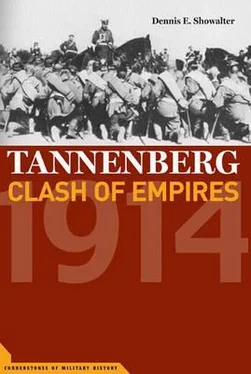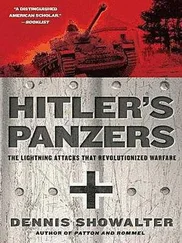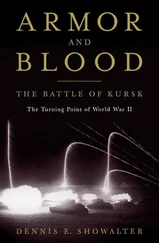69The respect accorded these men in German military circles reflected their status as experts on tactical and operational issues—a fact giving their opinions on broader questions a more polite hearing than might otherwise have been the case. Cf. Dennis E. Showalter, “Goltz and Bernhardi: The Institutionalization of Originality in the Imperial German Army,” Defense Analysis III (1987), 305–318.
70“Memorandum of December 28, 1912, on a War with France and Russia,” in Gerhard Ritter, The Schlieffen Plan: Critique of a Myth, M. A. and E. Wilson (New York, 1958), 168 ff.; and A. Bohm-Tettelbach, Der Böhmische Feldzug Friedrichs des Grossen 1757 im Lichte Schlieffensche Kritik (Berlin, 1934).
71“Die Militärpolitische Lage Deutschlands,” Dec. 2, 1911, in Kriegsrüstung und Kriegswirtschaft, ed. Reichsarchiv, Anlageband (Berlin, 1930), 126 ff.; “Die wichtigste Veränderungen im Heerwesen Russlands im Jahre 1911,” BA-MA, RM5/1946, Russland Militärisches, Apr. 1892-Apr. 1914.
72Paul M. Kennedy, “The First World War and the International Power System,” in International Security IX (Summer, 1984), 28–29. Parallel critiques of the Russian army are John Bushnell, “The Tsarist Army after the Russo-Japanese War: The View from the Field,” and W. C. Fuller, “The Tsarist Army after the Russo-Japanese War: The View from the War Ministry,” in The Impact of Unsuccessful Military Campaigns on Military Institutions, 1860–1980, ed. Lt.-Col. C. E. Shrader (Washington, D.C., 1984), 77–99, 100–119. Walter T. Wilfong, “Rebuilding the Russian Army, 1905–1914: The Question of a Comprehensive Plan for National Defense” (Ph.D. Dissertation, Indiana University, 1977), is a bit more optimistic, but remains negative.
73Modris Eksteins, “When Death Was Young… : Germany, Modernism, and the Great War,” in Ideas into Politics: Aspects of European History 1880–1950, ed. R. J. Bullen et al. (London, 1984), pp. 25–35, is an eloquent brief presentation of Germany in the modern era as “more modern than we have had the courage to admit” (p. 33). Frank J. Ward, “The Center Party and the German Election of 1907” (Ph.D. Dissertation, University of California, Los Angeles, 1984) is a convincing case study showing that the Reich by 1907 had moved much closer to parliamentary responsibility than is generally accepted.
74For Russia’s new cultural position see Camilla Gray, Die russische Avant-garde der modernen Kunst 1863–1922 (Köln, 1962). German responses are presented in Brigitte Löhr, Die “Zukunft Russlands”: Prospektiven russischer Wirtschaftsen-twicklung und deutsch-russische Wirtschaftsbeziehungen vor dem Ersten Weltkrieg (Wiesbaden, 1985); Werner Markert, “Die deutsch-russischen Beziehungen am Vorabend des ersten Weltkrieges,” in Deutsch-russische Beziehungen von Bismarck bis zur Gegenwart, ed. W. Markert (Stuttgart, 1964), 40–79; and Robert C. Williams, “Russians in Germany: 1900–1914,” in 1914: The Coming of the First World War, ed. W. Laqueur, G. L. Mosse (New York, 1966), 254–282.
75For the history and significance of German intelligence operations cf. Fritz Gempp, “Geheimer Nachrichtendienst und Spionageabwehr des Heeres,” National Archives T-77, rolls 1,438–1, 440, 1,442, 1,507–1,509, Part I, passim; and the excellent analysis by Holger Herwig, “Imperial Germany,” in Knowing One’s Enemies, 62–97
76Keith Neilson, “Watching the ‘Steamroller’: British Observers and the Russian Army before 1914,” The Journal of Strategic Studies VIII (1985), 199–217.
77Moscow consulate to Bethmann, Feb. 8, 1913; PAAA, Russland 72/92; Warsaw consulate to Bethmann, PAAA, Russland 72/95; reports of Feb. 23, 1913, ibid.
78Eggeling to Bethmann, Feb. 2, 1913; PAAA, Russland 72/94; Russian ambassador to Jagow, Aug. 18, 1913; ibid., 72/95; Warsaw consulate to Bethmann, Oct. 26, 1913, PAAA, Deutschland 131/35.
79Memorandum of Oct. 16, 1912; and attaché’s report of June 19, 1912, BA/MA, RM 5/1633.
80Eggeling to war ministry, Dec. 6, 1912; PAAA, Russland 72/94; Moltke to Bethmann, May 5, 1913, PAAA, Russland 72/95.
81Moltke to Bethmann, “Nachrichten über die militärische Lage in Russland,” Nov. 21, 1912; and Jan. 28, 1913; and Moltke to Kiderlin, Nov. 12, 1912, PAAA, Russland 72–93.
82Eggeling to war ministry, Aug. 28, 1913; Moscow consulate to Bethmann, July 4, 1913; Adolf Frank Export-Gesellschaft to foreign ministry, Dec. 12, 1913, PAAA, Russland 72/95; Knox to Buchanan, Nov. 10, 1912, BDFA VI, Nr. 126.
83“Die wichtigste Veränderungen im Heerwesen Russlands im Jahre 1913,” BA-MA, RM5/1486; Moltke to Bethmann, Jan. 7, 1914, PAAA, Russland 72/96.
84Germany, Reichsarchiv. Der Weltkrieg 1914 bis 1918, Vol. II (Berlin, 1925), 16–17.
85Beck’s defense of the Grosse Ostaufmarsch, “West-oder Ost-Offensive 1914?” is in Studien, ed. Hans Speidel (Stuttgart, 1955), 143–189. Cf. Adolf Gasser, “Deutschlands Entschluss zum Präventivkrieg 1913/1914,” Discordia Concors: Festgabe für Edgar Bonjour, Vol. I (Basel and Stuttgart, 1968), 171–224, esp. 175 ff.; and “Der deutsche Hegemonialkrieg von 1914,” in Immanuel Geiss and B. J. Wendt (eds.), Deutschland in der Weltpolitik des 19. und 20. Fahrhunderts, 2nd ed., rev. (Düsseldorf, 1974)), 307–339.
86Tappen’s comments of Oct. 22, 1919, in BA-MA, Nachlass Tappen, N 56/2.
87H. von Staabs, Aufmarsch nach zwei Fronten: Auf Grand der Operationsplane von 1871–1914 (Berlin, 1925).
88The war game is described in Jack Snyder, The Ideology of the Offensive-Military Decision-Making and the Disasters of 1914 (Ithaca, N.Y., 1984), 117; and Garros, “En Marge de l’Alliance,” 38.
89Tappen to H. H. von Pertz, July 20, 1928, BA-MA, Nachlass Tappen, N 56/4.
90For German evaluations of Russia’s military potential, cf. Bernd F. Schulte, Vor dem Kriegsausbruch 1914. Deutschland, die Türkei und der Balkan (Düsseldorf, 1980); and Risto Ropponen, Die Kraft Russlands. Wie Beurteilte die politische und militärische Führung der Europäischen Grossmächte in der Zeit von 1905 bis 1914 die Kraft Russlands (Helsinki, 1968). The evolution of military plans for the east is described in Graydon A. Tunstall, “The Schlieffen Plan: The Diplomacy and Military Strategy of the Central Powers in the East, 1905–1914” (Ph.D. Dissertation, Rutgers University, 1974); Ivo Lambi, The Navy and German Power Politics, 1862–1914 (Boston, 1984), 398 passim, covers the naval aspects.
91See, for example, Conrad’s recommendation of Mar. 25, 1913, that Austria must establish a reserve army. Conrad III, 187–188. Cf. Norman Stone, The Eastern Front, 1914–1917 (New York, 1975), 226 ff.; and Oskar Régele, Feldmarschall Conrad. Auftrag undErfüllung 1906–1918 (Vienna, 1955), 169.
920n Italy’s changing military policies, cf. Ludendorff’s report of Jan. 3, 1913; Moltke to Kleist, Jan. 1913; and the naval attaché’s report of Oct. 15, 1913, in BA-MA, RM5/2670. Michael Palumbo, “German-Italian Military Relations on the Eve of World War I,” Central European History XII (1979), 343–371, stresses the German military’s continued faith that Italy would honor her commitments. But cf. Alberto Monticone, Deutschland und die Neutralität Italiens 1914–1915, (Wiesbaden, 1982); and Risto Ropponen, Italien ais Verbündeter: Die Einstellung der politischen und militärischen Führung Deutschlands und Österreich-Ungarns zu Italien von der Niederlage von Adua bis zum Ausbruch des Weltkrieges 1914, tr. C. Krotzl (Helsinki, 1986).
Читать дальше












